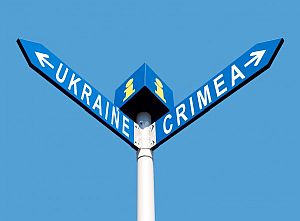Analytics, Baltic States – CIS, Direct Speech, EU – Baltic States, Legislation, Russia, Ukraine
International Internet Magazine. Baltic States news & analytics
Friday, 26.04.2024, 17:25
The Crimean crisis: influence and consequences on the international community
 Print version
Print version |
|---|
But it is not only society that changes, it is also a time of upheaval with regard to international relations and of the world order. This order can be altered by an accumulation of different factors and also the role of international organizations can change and evolve. A prime example for such changes is the current crisis in the relations between the EU, USA and Ukraine on one side and Russia on the other side about Ukraine’s Crimea. There is no doubt, that this crisis had and has an outstanding impact on both international relations and the world order as a whole.
During the Crimean crisis Ukraine, being at the center of a geopolitical battle between opposing world powers, was struggling for its state consolidation and territorial integrity and to stay united in the face of different risks and challenges resulting from such a geopolitical competition. Different world powers and international actors with diverging interests were involved in this crisis and were fighting for the outcome of that crisis that suited them the most. During this crisis the actions of some international players and the final objectives that these players wanted to achieve very often didn’t coincide and actually very often were mutually exclusive resulting in a political deadlock during the whole period of the Crimean crisis.
The international and European organizations were not exempted from this transformation either. Their roles changed from being guarantors of international peace and stability back to constituting a framework for discussions and even verbal fights and straightforward denials of facts by diplomats. In the Crimean Crisis the international and European organizations tried to mediate and negotiate positive outcomes between the main actors of the conflict but could not make a breakthrough. The institutions were doing what they always do: some adopted one declaration, recommendation and resolution after the other in which Russia was first condemned for its aggression and ultimately the referendum in Crimea was declared illegal. The actors from the institutions formulated series of statements and frequently went on working trips to Ukraine for both formal and informal discussions. Both international and European institutions tried to put pressure on Russia and often worked on trimming back and reducing relations with the Russian representatives working in the same institutions to a minimum. All these efforts however did not bring about the positive result the institutions were hoping for: an end to the conflict between Russia and Ukraine and the preservation of Ukraine’s territorial integrity with Russia accepting Crimea as a part of Ukraine. The often competing forces in the institutions did not contribute enough to find and promote conciliatory measures before the referendum in Crimea was rushed through by Russia against all resistance to legalize. While the events in Crimea were speeding up on a daily basis, the long timeframe factor and the hierarchical character of the institutions proved to utterly unsuited for this kind of crisis. It has become fairly obvious that the initially wished-for result of the work of the international and European institutions – the territorial integrity of Ukraine – failed.
During the course of the Crimean Crisis the actual interests of some Member States and their actors have become more transparent than ever before. As many Member States fought hard for outcomes of the crisis that suited their national interests best and that preserved their status quo in the conflict their interest-driven behavior became more obvious. The different positions of the Member States in the Crimean Crisis and the motivations behind these positions made finding a consensus and therefore a positive outcome a more than challenging undertaking. The crisis clearly showed that many Member States are not ready or willing to enter a confrontation with Russia, mainly because of the interdependent character of their relations with it – it is not difficult to identify economic interdependence and the energy dependence of various Member States from Russia as a central element in the hesitation of those Member States to support a confrontation with Russia.
The current situation in Ukraine is a direct result of this accumulation of internal and external factors. Many of the involved actors had to learn some lessons in geopolitics, many actors need to rethink their attitude and their policies towards the Eastern Neighborhood or to adapt themselves to the new status quo. The one thing that has become clear however is that the world is changing and that profound changes in international and European security policy are underway. To reverse these changes would require time and willingness from all sides. To transform the shattered security policy into something new and effective will require a lot of effort, a considerably increased level of unanimity with regard to taking action and, from both sides, readiness to act and to move forward.
This period of global changes affects us all, even if for now we might not notice these changes very clearly in our day-to-day routine or because the bigger issues are obscured by more trivial daily factors and worries. But this does not change the fact that these changes are happening and that they bring pain and disappointment to some of us while they are perceived as encouraging and revealing for others. But whatever one’s personal stance is, most of us would agree that it would be better for these changes to happen without human, diplomatic, moral, economic or other losses. As human beings our basic interests are the same: to enjoy the beauty of life in a world where the sun is shining and where all neighbors live together peacefully under one roof in a shared house in which nevertheless everybody is allowed to be unique.








 «The Baltic Course» Is Sold and Stays in Business!
«The Baltic Course» Is Sold and Stays in Business!

